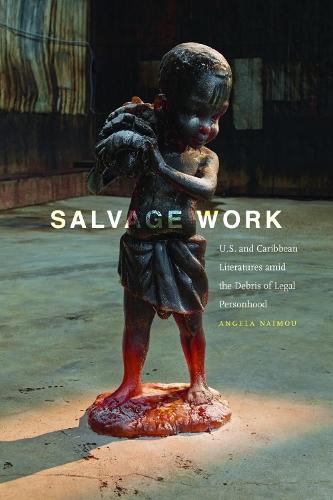Full Product Details
Author: Angela Naimou
Publisher: Fordham University Press
Imprint: Fordham University Press
ISBN: 9780823278725
ISBN 10: 0823278727
Pages: 304
Publication Date: 05 September 2017
Audience:
Professional and scholarly
,
Professional & Vocational
Format: Paperback
Publisher's Status: Active
Availability: In Print

This item will be ordered in for you from one of our suppliers. Upon receipt, we will promptly dispatch it out to you. For in store availability, please contact us.
Reviews
Angela Naimou's superbly written Salvage Work is one of the smartest responses to Giorgio Agamben's `death-bound theories of legal personhood.' Rather than take the refugee as the singular figure for theorizing the limits of sovereignty and the subject of law, Naimou studies the disruptions to a liberal rights paradigm through her focus on equally troubling cases of exceptional personhood in the figures of, among others, the slave, the disappeared, the corporation, the sailor, the fugitive, and the fetus. The legal and political insights are all the more powerful because they emerge from meticulous close readings of U.S. and Caribbean fiction, reminding us of just how much the world needs humanities-based and literary thinking if we are to tackle the most important problems of our time in their full weight and complexity. -- -Joseph R. Slaughter * Columbia University * Salvage Work is a unique and exciting study that engages with a variety of disciplines, including American studies, Caribbean studies, and postcolonial studies. This is a beautifully written book that offers astute, nuanced close readings of the literary works that expose the critical intersections between law, empire, personhood, and literature. -- -April Shemak * Sam Houston State University * Salvage Work is a thoughtful and timely exploration of the historical, ideological, and political significance of legal personhood in very contemporary fiction. Salvage Work is a wonderful incorporation of a deep body of legal history . . . moving away from purely `cultural' definitions and recognizable political trajectories and toward a complicated reading of identity. -- -Samantha Pinto * Georgetown University *
Salvage Work is a thoughtful and timely exploration of the historical, ideological, and political significance of legal personhood in very contemporary fiction. Salvage Work is a wonderful incorporation of a deep body of legal history . . . moving away from purely cultural definitions and recognizable political trajectories and toward a complicated reading of identity. -Samantha Pinto, Georgetown UniversitySalvage Work is a unique and exciting study that engages with a variety of disciplines, including American studies, Caribbean studies, and postcolonial studies. This is a beautifully written book that offers astute, nuanced close readings of the literary works that expose the critical intersections between law, empire, personhood, and literature. --April Shemak, Sam Houston State University Angela Naimou's superbly written <em>Salvage Work</em> is one of the smartest responses to Giorgio Agamben's 'death-bound theories of legal personhood.' Rather than take the refugee as the singular figure for theorizing the limits of sovereignty and the subject of law, Naimou studies the disruptions to a liberal rights paradigm through her focus on equally troubling cases of exceptional personhood in the figures of, among others, the slave, the disappeared, the corporation, the sailor, the fugitive, and the fetus. The legal and political insights are all the more powerful because they emerge from meticulous close readings of U.S. and Caribbean fiction, reminding us of just how much the world needs humanities-based and literary thinking if we are to tackle the most important problems of our time in their full weight and complexity. --Joseph Slaughter, Columbia University
Angela Naimou's superbly written Salvage Work is one of the smartest responses to Giorgio Agamben's `death-bound theories of legal personhood.' Rather than take the refugee as the singular figure for theorizing the limits of sovereignty and the subject of law, Naimou studies the disruptions to a liberal rights paradigm through her focus on equally troubling cases of exceptional personhood in the figures of, among others, the slave, the disappeared, the corporation, the sailor, the fugitive, and the fetus. The legal and political insights are all the more powerful because they emerge from meticulous close readings of U.S. and Caribbean fiction, reminding us of just how much the world needs humanities-based and literary thinking if we are to tackle the most important problems of our time in their full weight and complexity. -- -Joseph R. Slaughter Salvage Work is a unique and exciting study that engages with a variety of disciplines, including American studies, Caribbean studies, and postcolonial studies. This is a beautifully written book that offers astute, nuanced close readings of the literary works that expose the critical intersections between law, empire, personhood, and literature. -- -April Shemak Salvage Work is a thoughtful and timely exploration of the historical, ideological, and political significance of legal personhood in very contemporary fiction. Salvage Work is a wonderful incorporation of a deep body of legal history . . . moving away from purely `cultural' definitions and recognizable political trajectories and toward a complicated reading of identity. -- -Samantha Pinto
Author Information
Angela Naimou is Associate Professor of English at Clemson University.




